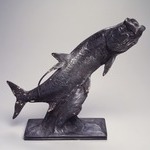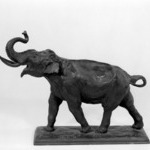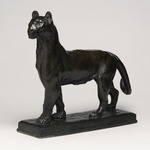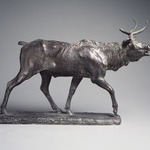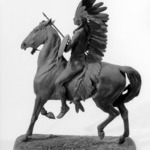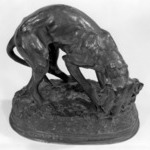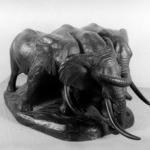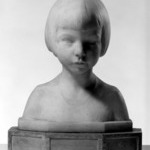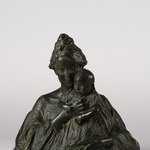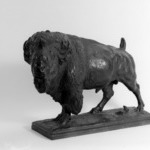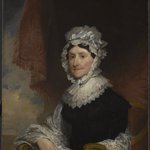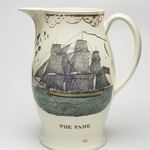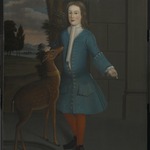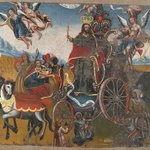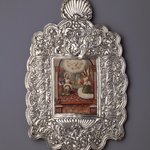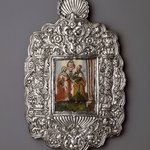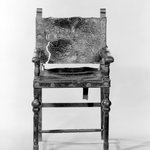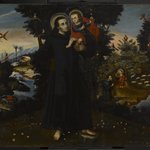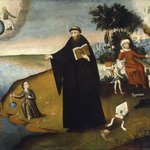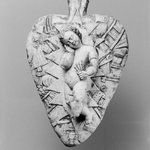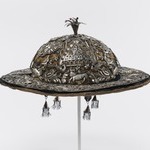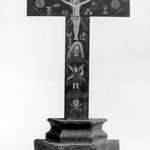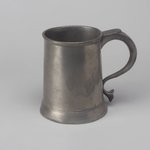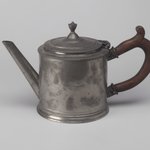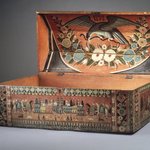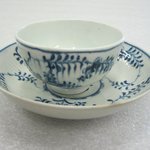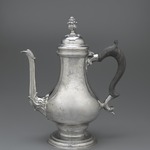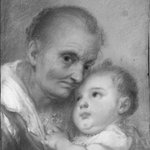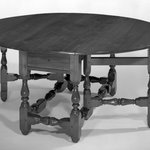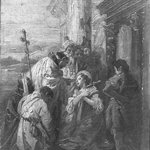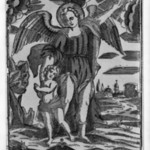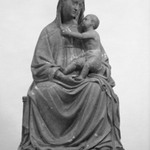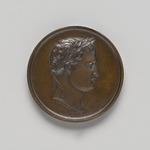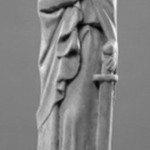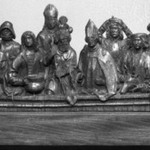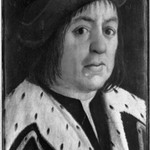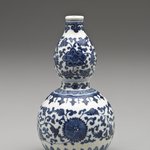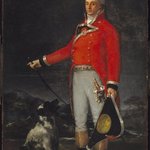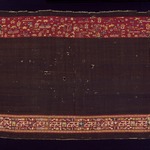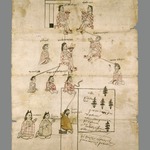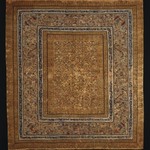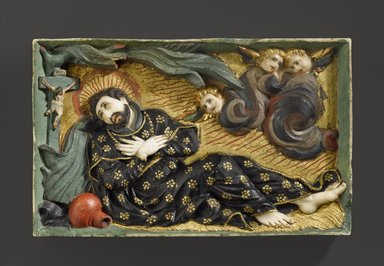
Vision or Death of Saint Francis Xavier
Unknown
American Art
On View: Luce Visible Storage and Study Center, 5th Floor
THE APARADOR
Throughout colonial Spanish America, collectors of all heritages acquired luxury objects of diverse origins and displayed them in crowded groups. Aparadores, or small display cabinets with glass or wire-mesh doors, were set against the walls of the estrado and used to exhibit a variety of precious objects, in emulation of the fashionable European curiosity cabinets.
Asian or Asian-inspired pieces were extremely popular and included objects such as Chinese vases or American-made pottery vases in the Chinese style, Asian objects in hard stone, and Chinese porcelain figurines, especially Chinese guardian lions (Fu-dogs). Also on view were aromatic earthenware from Tonalá, Panama, and Chile, which sometimes were mounted in silver; glass objects; small alabaster or ivory religious figurines and plaques; gold and silver objects, especially those with animal designs; silver-filigree artifacts; coral branches or seashells mounted in gold or silver; carved coconut shells mounted in silver; and small religious images.
EL APARADOR
En la América colonial española, coleccionistas de todos los estratos sociales adquirían objetos suntuarios de diverso origen y los exhibían en grupos abigarrados. Emulando a los gabinetes de curiosidades europeos de moda, los aparadores, o pequeñas vitrinas con puertas de vidrio o de malla metálica, arrimados a las paredes del estrado, se usaban para exponer una gran variedad de objetos preciosos.
Piezas asiáticas o de inspiracíon asiática eran sumamente populares e incluían objetos como jarrones chinos o jarrones de cerámica americana al estilo chino, objetos asiáticos en piedras duras y estatuillas de porcelana china; entre estas últimas destacaban especialmente los leones guardianes chinos (perros Fu). También se exponían vasijas de arcilla aromática de Tonalá, Panamá y Chile, ocasionalmente montadas en plata; objetos de vidrio; pequeñas estatuillas religiosas y placas decorativas de alabastro o marfil; objetos de oro y de plata, sobre todo aquellos con diseños de animales; artefactos de filigrana de plata; ramas de coral o conchas marinas montadas en oro o plata; nueces de coco talladas y montadas en plata y pequeñas imágenes religiosas.
Throughout colonial Spanish America, collectors of all heritages acquired luxury objects of diverse origins and displayed them in crowded groups. Aparadores, or small display cabinets with glass or wire-mesh doors, were set against the walls of the estrado and used to exhibit a variety of precious objects, in emulation of the fashionable European curiosity cabinets.
Asian or Asian-inspired pieces were extremely popular and included objects such as Chinese vases or American-made pottery vases in the Chinese style, Asian objects in hard stone, and Chinese porcelain figurines, especially Chinese guardian lions (Fu-dogs). Also on view were aromatic earthenware from Tonalá, Panama, and Chile, which sometimes were mounted in silver; glass objects; small alabaster or ivory religious figurines and plaques; gold and silver objects, especially those with animal designs; silver-filigree artifacts; coral branches or seashells mounted in gold or silver; carved coconut shells mounted in silver; and small religious images.
EL APARADOR
En la América colonial española, coleccionistas de todos los estratos sociales adquirían objetos suntuarios de diverso origen y los exhibían en grupos abigarrados. Emulando a los gabinetes de curiosidades europeos de moda, los aparadores, o pequeñas vitrinas con puertas de vidrio o de malla metálica, arrimados a las paredes del estrado, se usaban para exponer una gran variedad de objetos preciosos.
Piezas asiáticas o de inspiracíon asiática eran sumamente populares e incluían objetos como jarrones chinos o jarrones de cerámica americana al estilo chino, objetos asiáticos en piedras duras y estatuillas de porcelana china; entre estas últimas destacaban especialmente los leones guardianes chinos (perros Fu). También se exponían vasijas de arcilla aromática de Tonalá, Panamá y Chile, ocasionalmente montadas en plata; objetos de vidrio; pequeñas estatuillas religiosas y placas decorativas de alabastro o marfil; objetos de oro y de plata, sobre todo aquellos con diseños de animales; artefactos de filigrana de plata; ramas de coral o conchas marinas montadas en oro o plata; nueces de coco talladas y montadas en plata y pequeñas imágenes religiosas.
ARTIST
Unknown
MEDIUM
Polychromed Huamanga stone
DATES
18th century
DIMENSIONS
4 5/8 x 7 1/2 x 3/4in. (11.7 x 19.1 x 1.9cm) (show scale)



COLLECTIONS
American Art
ACCESSION NUMBER
41.1275.195
CREDIT LINE
Museum Expedition 1941, Frank L. Babbott Fund
EXHIBITIONS
MUSEUM LOCATION
This item is on view in Luce Visible Storage and Study Center, 5th Floor
CAPTION
Unknown. Vision or Death of Saint Francis Xavier, 18th century. Polychromed Huamanga stone, 4 5/8 x 7 1/2 x 3/4in. (11.7 x 19.1 x 1.9cm). Brooklyn Museum, Museum Expedition 1941, Frank L. Babbott Fund, 41.1275.195. Creative Commons-BY (Photo: Brooklyn Museum, 41.1275.195_PS6.jpg)
IMAGE
overall, 41.1275.195_PS6.jpg. Brooklyn Museum photograph, 2013
"CUR" at the beginning of an image file name means that the image was created by a curatorial staff member. These study images may be digital point-and-shoot photographs, when we don\'t yet have high-quality studio photography, or they may be scans of older negatives, slides, or photographic prints, providing historical documentation of the object.
RIGHTS STATEMENT
Creative Commons-BY
You may download and use Brooklyn Museum images of this three-dimensional work in accordance with a Creative Commons license. Fair use, as understood under the United States Copyright Act, may also apply.
Please include caption information from this page and credit the Brooklyn Museum. If you need a high resolution file, please fill out our online application form (charges apply).
For further information about copyright, we recommend resources at the United States Library of Congress, Cornell University, Copyright and Cultural Institutions: Guidelines for U.S. Libraries, Archives, and Museums, and Copyright Watch.
For more information about the Museum's rights project, including how rights types are assigned, please see our blog posts on copyright.
If you have any information regarding this work and rights to it, please contact copyright@brooklynmuseum.org.
RECORD COMPLETENESS
Not every record you will find here is complete. More information is available for some works than for others, and some entries have been updated more recently. Records are frequently reviewed and revised, and we welcome any additional information you might have.
